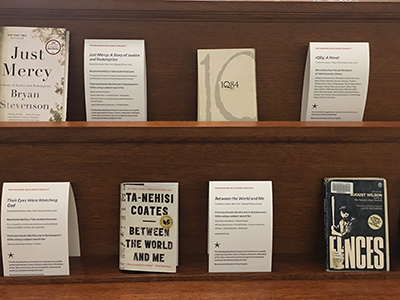A display at one entrance to Bass Library and a whiteboard covered with scribbled titles at the other are bookending the latest iteration of the library’s Reading Resilience program, presenting recommended reading from students and other members of the Yale community.
In 2015, during a wave of student activism aimed at making Yale more inclusive, the library partnered with student groups to find new ways of highlighting the voices of commonly underrepresented peoples in library collections. Students were invited to recommend books and other creative works “by and about people of color” – and the Reading Resilience project was born.
Since then, the library has continued to solicit suggestions from the Yale community and periodically has mounted displays of recommended books. Each book is accompanied by a card with a short synopsis or a quotation from the student who originally recommended it.
This year’s display, located just inside the entrance from Thain Café, has been so popular that staff have had to refill the shelves with additional titles and copies to replace those that have been checked out.
At the opposite end of Bass, near the tunnel entrance, a whiteboard gives library patrons the option to suggest additional titles. This year, the board has been quickly covered with a rainbow of scribbled titles, and some patrons have been spotted snapping pictures for future reference.
“People are very thoughtful in their interactions with the whiteboard,” said Emily Horning, the library’s director of undergraduate research, education and outreach. “I especially like the comments people are leaving on others’ contributions: ‘Amazing book’ or ‘I second that!’ Sometimes they just underline another person’s suggestion for emphasis, or draw a heart.”
The Reading Resilience book display will run through March 20. Members of the Yale community may also view the list and make recommendations online throughout the year.
Story and photos by Tricia Carey
